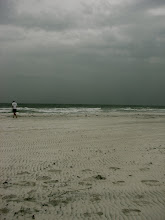I suppose my salamander had a name, but I can't recall it. I kept it in a coffee can with some water and rocks, as best I can recall, or maybe I kept it in one of the old turtle pens--those clear plastic dishes with a clear plastic island in the middle where a little plastic palm tree stuck up. But I can't imagine I kept it in a turtle pen because, if turtles could escape from those, then a salamander would have no compunction about making a break for it. And I also don't recall exactly how I got him (her?) in the first place.
To the best of my memory, I remember stopping after school at some spot--a creek or pond--where salamanders and frogs and such were. Some friend of mine would go there with me and we'd try to catch them, and did catch them. But this is also a foggy recollection, as I can't seem to place this stream or pond in with my neighborhood or to-and-from-school walk. Perhaps I captured it on some trip or picnic with my family. I don't know. I just know that I did catch it and did take it home and did keep it for a while as a pet.
But the thing was, I knew it was a bad idea. I loved slippery and strange creatures--amphibians and reptiles especially--yet at that age (seven or eight) I also understood that these were wild animals, that captivity was simply that: an unnatural prison term. And this weighed on my little boy brain. I mean, I wanted to keep my salamander but I also had pangs of higher consciousness, knew that the salamander did not want to be kept by me. So at times, I'd take the amphibian outside to play. I'd let it loose in my back yard, but also keep a tight watch on it. Maybe, in some ways, I'd hope that it would escape, that it would free itself and then my little moral conundrum would be solved, but of course, I never took my eye off it long enough for it to be free of me. The salamander was like a toy, one that the child (me) was on the cusp of outgrowing, a toy that the child (again, me) still enjoyed at times but also saw as childish or beneath the child's (you get the idea) new level of maturity. So, one day I decided to put away my childish thing.
My father had a lot of plants--flowering bushes, hedges, young trees that he had planted. Each one of these new plants (our house had been brand new, without any real plants or trees [save the big maple in back], not even grass in the yard) each one had a deeply cut perfect circle like a basin into which it had been planted. This was how Father planted his plants, in a deep circle so that he could fill this circle up with water and that water would sit for a while like a muddy pool. And so, one weekend day, I took my coffee can with my red salamander in it out to the back yard where my father was doing his usual heavy watering of his young plants. And I took out my salamander to play with it as I had done many times, but this time I decided I'd let it go for a swim. And I put it into the muddy pool beneath some bush or another and I watched it go in and under and disappear from sight and I did not try to reach in there and find it.
I let it go.
I knew what I was doing, but still--somewhere in my boy brain--pretended that I was only playing with it, not letting it escape. A strange dichotomy of thought. I was setting it free while telling myself I was not setting it free.
Oh, I moped around about it all the rest of that day, even days, weeks, months, maybe years, later. I loved salamanders and such. I even went looking for it, though I knew it wouldn't be there. But I checked that black dirt numerous times, just in case the amphibian was still there. And yes, I think even then I knew that I had not let it go in the best of places. There was no stream or pond close to our house, so I doubt the red salamander survived.
But maybe it did. It survived a life in the coffee can, it survived trips in my pocket, trips to the back yard. It survived being handled by me and other curious kids. So maybe it had the requisite chutzpa to climb out of the circular muddy pool after the water had drained, climb out and traverse the grassy yard, make it through the tangle of bushes and into the open field, past new-house construction, cross the streets, maybe a highway, and find a fresh source of free-flowing water in that urban area of the Great Pacific Northwest.
Yes indeed. I'm sure it did. My pet salamander still lives to this day.
